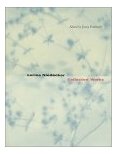|
Contents » Cover |
||
|
Reviews
This new edition of Lorine Niedecker's writings will be appreciated by those who enjoy her poetry for many reasons. Before this volume, Niedecker's poetry has mostly been published by small presses in tiny editions. Trying to find her books has invariably involved hunting around rare book stores, or on the internet, and has generally been a very costly business. Even though many volumes of poetry appeared under Niedecker's name, a full and accurate picture of her work has never before been available. Jonathan Williams' Jargon Press attempted a complete edition in 1985: unfortunately, as well as being beset by what Penberthy describes as "pervasive textual errors," a large part of the edition was destroyed in a warehouse fire. This volume therefore offers the general reader for the first time access to the full range of Niedecker's work—not only her poems, but also prose pieces and radio plays. Niedecker was a reclusive writer, hardly published during her lifetime. Moreover, she was as a writer extremely acquiescent to editorial intervention. Penberthy suggests that this stemmed partly from her "anti-authorial practice"—Niedecker consistently kept all autobiographical and authorial information to a minimum—and partly from "the pragmatism of a poet . . . eager to be published." Whatever the reason, this volume is essential reading for those wishing to understand how Niedecker herself intended her poems to be edited and grouped, and how individual poems developed over time. This is particularly fascinating in the sequence "For Paul and Other Poems," written in the 1950s but never published as a whole before now. Penberthy shows us how the sequence was arranged and rearranged, and how each poem was developed and revised, often dramatically. For example, "Dear Paul: the sheets of your father's book of poetry . . ." is condensed over time from 5 pages to just 33 lines; and "He lived . . ." appears in six different versions. Moreover, Collected Works offers the full breadth of Niedecker's poetry. Niedecker the Objectivist is here in abundance; but also present are the early writings of Niedecker the surrealist, Niedecker the socialist, and in the extraordinary "Next year or I Fly My Rounds Tempestuous," Niedecker the creator of artists' books. This work, which is beautifully represented, consists of a poem sequence written in manuscript on a 1935 calendar. Even in this early work, the voice of the later Niedecker can be discerned:
Wade all life / backward to its / source which / runs too far / ahead (Jan 1-12) Throughout the book extensive footnotes illuminate Niedecker's writings, and provide a biographical and bibliographical commentary. Finally, the book is beautifully designed, as an object to be held and read. The poems, though often very short, are allowed space to breathe on the page. There is none of the sense of crowding which so often besets complete works. The minimalist leaf illustrations on the cover and throughout—by Ella MacBride—give a sense of unity and continuity with earlier volumes such as "T & G" and "North Central." A slight gripe would be that it feels to this reviewer that Penberthy underplays the importance of the efforts of the Jargon Press in maintaining public awareness of Niedecker. Regardless of its faults, Jargon's From this Condensery: The Complete Writings presented Niedecker as a poet deserving of a collected works, and essentially added her to the American canon. But on the whole, this is an excellent, and for this reader, an essential publication.
|
|||||
